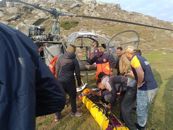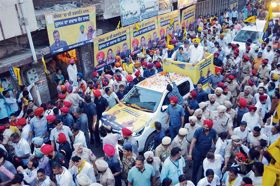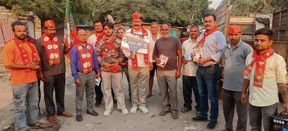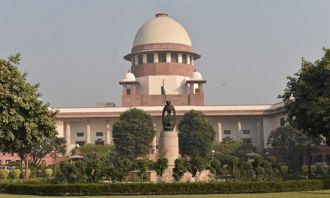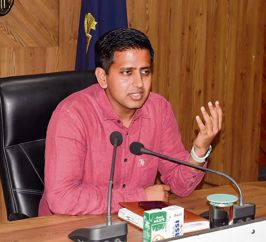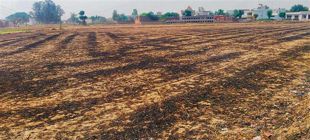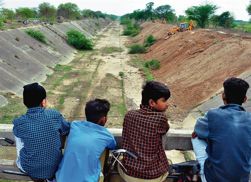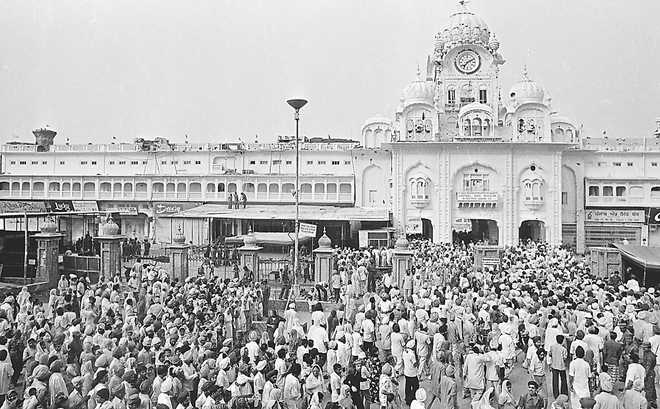
matters of faith: Devotees gather to pay obeisance at the Harmandar Sahib after Operation Blue Star in June 1984. Tribune photo: Yog Joy
Dinesh Kumar
Politicians and religious leaders find it easy to engage in revivalism and, then, crank up a politics of memory. The more gory the memory, the “better” politics it makes. But more importantly, such memories are likely to find acceptance among sections of the public and makes a collectively accepted closure, all that more difficult to emerge.
Such is the case with Operation Blue Star. Even after 32 years, it continues to be a topic of discourse this time every year. Of late, Operation Blue Star has been figuring with greater intensity and even a memorial commemorating the incident has been raised in the precincts of the Golden Temple three decades later in April 2014 which was followed by a “clash” between SGPC guards and members of Sikh extremist groups in June 2014.
When viewed clinically, the Army operation ( June 5-6) was aimed at evicting 37- year-old Damdami Taksal chief Jarnail Singh Bhindranwale and his armed militia who had converted the holy shrine into an armed fortress from where he was running a virtual parallel government, provoking wanton violence across the state and publicly spewing venom against a particular community. Bhindranwale, who had caught the imagination of sections of the Sikh community, had come to command fear among the general public, politicians and all wings of the state government. The government chose to remain a silent spectator to reports of arms and ammunition, ranging from rifles to rocket launchers, being regularly transported in kar sewa trucks entering the temple complex.
But for a majority of the Sikh community, Operation Blue Star became an attack on their most revered and historic shrine and that too barely two days after Guru Arjan Dev's martyrdom day. Indeed when it comes to matters of faith, it is difficult to view a single action in isolation or to rationalise it.
Operation Blue Star, the name given by the Army, will remain a tragic event in India's post-Independence history from which no winners emerged. It neither ended terrorism nor religious militant politics, which in fact manifested itself in horrific proportions thereafter. In a series of revenge killings, Prime Minister Indira Gandhi was assassinated (October 1984), followed by horrific reprisal anti-Sikh violence (November 1984), two hijackings of Indian Airlines aircraft (July and August 1984), downing of an Air India Boeing 747 in a mid-air explosion caused by Canada-based militants killing all 329 on board (June 1985), the assassination of General Arun Shridhar Vaidya (August 1986), who was the Army Chief during Operation Blue Star, and the knifing of Lt General Kuldeep Singh Brar in London (September 2012), who as major general, led Operation Blue Star.
Historians are still divided on whether the operation could be conducted differently. And, more pertinently, whether we have learnt any lessons. A professional, apolitical and secular Army was asked to undertake a severely traumatic and thankless mission on the directions of the government. Lt General Brar, then a major general commanding 9 Infantry Division, was given just 48 hours to draft his plan for an unprecedented operation of such magnitude and sensitivity. It was first discussed on June 3 and then finetuned before embarking on the operation, which began at 10.30 pm on June 5. Unprepared troops with no training of close quarter battle warfare in built-up areas and having no inkling of the operation were moved at short notice from Meerut.
The only troops which had undergone prior training for such an operation was a Company strength (about 125 soldiers) of the Special Frontier Force about which Brar was informed a day earlier (June 4). As both Brar and then Western Army Commander, Lt General (later General) Krishnaswamy Sundarji, were to later say, intelligence was limited and the impression given was that they were a motley bunch armed with antiquated rifles, an assortment of pistols and revolvers and only a few machine guns.
Tanks were ordered to fire from their main cannon after receiving a clearance from Delhi only at 7.30 am on June 6, a full nine hours after facing stiff resistance from approximately 100 well-armed militants entrenched in the heavily fortified Akal Takht building of which all openings had been closed with bricks and sandbags, with specially created small loopholes and pill boxes to tactically well site 31 machine guns (of a total 51 later recovered), two rocket launchers, innumerable rifles, grenades and other small arms. The Army, which was engaged in a suicidal frontal attack, had by 7.30 am lost over 50 soldiers (of the total 88 killed), with over twice that number wounded (of the total 248) in the vicinity of the temporal seat alone.
Operation Blue Star is an event for which politicians at the Centre and the state need to take collective responsibility. Why was the situation allowed to build up in the first place? Why was the Golden Temple permitted to be converted into an armed fortress? Who promoted and mollycoddled Bhindranwale and why, are some of the many questions that need to be honestly accounted for. The then politics at play is what needs to be severely condemned and never repeated. To some extent the government has learnt its lessons by exercising restraint during Operation Black Thunder-II in Amritsar (May 1988) and the almost month-long Hazratbal crisis in Srinagar (October-November 1993). Above all, this much should be clear: religious leaders must ensure that places of worship are not misused and politicians must never play politics with religious sentiments.













